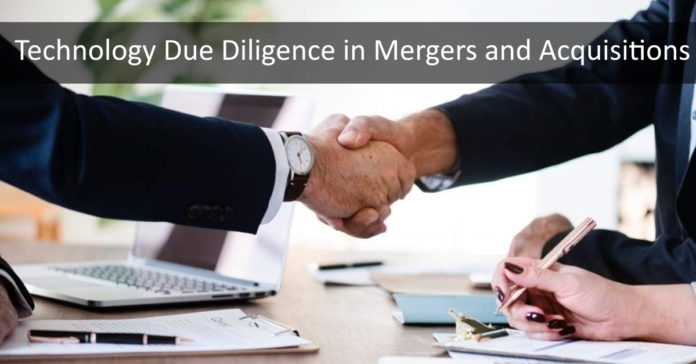
Mergers and Acquisitions are forms of external restructuring in business circles that have come to stay when you take into cognizance the fact that despite the COVID-19 pandemic, mega deals have continued to sail through. Before any Merger or Acquisition, especially the lucrative ones, take place, the entities involved usually carry out what is known as M&A Due Diligence. Just what is M&A Due Diligence and why is Technological Due Diligence Crucial in Mergers and Acquisitions? This article provides the answers to these questions and many more.
What is Due Diligence?
Some have opined that M&A Due Diligence is an investigation of the target company and its business by the acquiring company before the consummation of the merger. Thus, before any binding merger agreement or transfer or final purchase agreement is made, there is a need to investigate and be satisfied with the accuracy of the information supplied by the target company to the acquiring company so that the acquisition is not made on faulty assumptions or wrong information.
Business prudence also requires that the target company conducts due diligence on the acquiring company to see if it can acquire it and conduct internal due diligence on itself before making representations and warranties to avoid making misstatements that may render it liable in the future. The issue with most people’s view of M&A Due Diligence is that they only focus on the Legal and Financial aspects. One critical but usually overlooked facet of M&A Due diligence in this world where Content Intelligence has become invaluable is Technological Due Diligence.
What is Technological Due Diligence?
Technological Due Diligence in M&A parlance entails an evaluation and critical analysis of the processes, products, and technology in a target organization before an acquiring company invests in it. The acquiring company in carrying out Technological Due Diligence considers such factors as the architecture and infrastructure present in the target company as well as cybersecurity. To carry out Technological Due diligence, there are certain areas which the acquiring company must look into. Some of these include:
- The technical debts of the target company to check whether or not they have been overspending on technology.
- Whether the target company operates proprietary technology
- Whether the technology utilized by the target company is patented.
The following are the reasons why Technological Due Diligence is Crucial in Mergers and Acquisitions:
-
To weed out Obsolete Hardware
Hardware and equipment besides the human workforce make up part of the prized assets that any acquiring company inherits after the M&A process. It is for this reason that Technological Due Diligence is so important as it enables the acquiring company to know the hardware and equipment that need replacement.
Generally, it will be ill-advised for acquiring companies to keep any hardware that has been in use for up to half a decade or more as this can lead to issues such as lack of compatibility, expiration of warranties, and slow performance. Even though not all hardware would necessarily need replacement, Technological Due diligence helps to acquire as well as target companies know the level that they each are when it comes to the condition of mobile devices, workstations, and laptops.
-
To Determine Digital Communications Network
Digital communication is vital to most businesses. With that said, where the staff of these now merging entities operated completed different digital communication systems, there may be a need to train them on the new chosen mode or technology to be utilized in communication. A clear instance where this would be an issue would be where company A (the target company) used traditional or orthodox means of communication whereas company B (the acquiring company) utilizes more modern means of digital communication. It is clear that for both companies to thrive together as one following their M&A, the gap between the staff of both companies will need to be bridged. A gap that is only discoverable as a result of Technology Due Diligence.
-
Cybersecurity
Parties to an M&A must take the initiative and take active steps to have PII Data Privacy solutions to ensure that they conduct technology due diligence because it can help protect their data from cyberattacks, malware, and viruses. As a part of their M&A Due diligence, they need to look into the type of antivirus software in place, whether there is insurance coverage in the case of a cyberattack, and just how much that coverage is or would cost, and whether content intelligence is utilized.
Foregoing a Cybersecurity audit when carrying out due diligence is tantamount to flying blind into an M&A as it naturally increases data liability.
-
Developing Steps to ensure Business Continuity
Technological due diligence is critical to M&A because it enables the parties to come up with strategies for ensuring business continuity. In business as with life, we hope for the best but you have to plan for the worst and that exactly is what Technological due diligence enables parties to do. It helps them consider plans on how to effectively backup and recover data in the event of a disaster. These steps may also include encryption, and test-running recovery processes beforehand to ensure that disasters do not necessarily spell the end of business for M&A companies.
-
Productivity Software
The ultimate goal of M&A is to ensure continued productivity and security. And that is the reason why Productivity Software has found a niche in content intelligence. However, where entities involved in an M&A are not technologically on par or on the same page, the use of productivity software may be limited pending the time when the staff is either trained or another easy-to-use method is adopted. Only by doing technology due diligence can the M&A entities discover this disparity.
Conclusion
As we mentioned earlier, the view of most persons that M&A Due Diligence entails only Legal and Financial considerations is a faulty one. As this article has detailed, technology due diligence is just as important as it can forecast how smooth and rapid growth can be achieved from any M&A.





